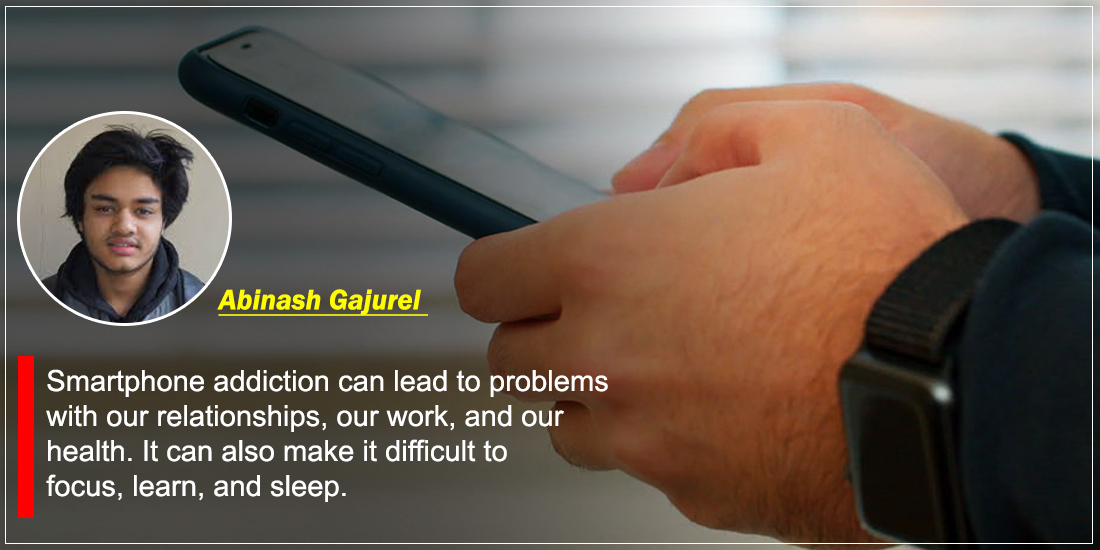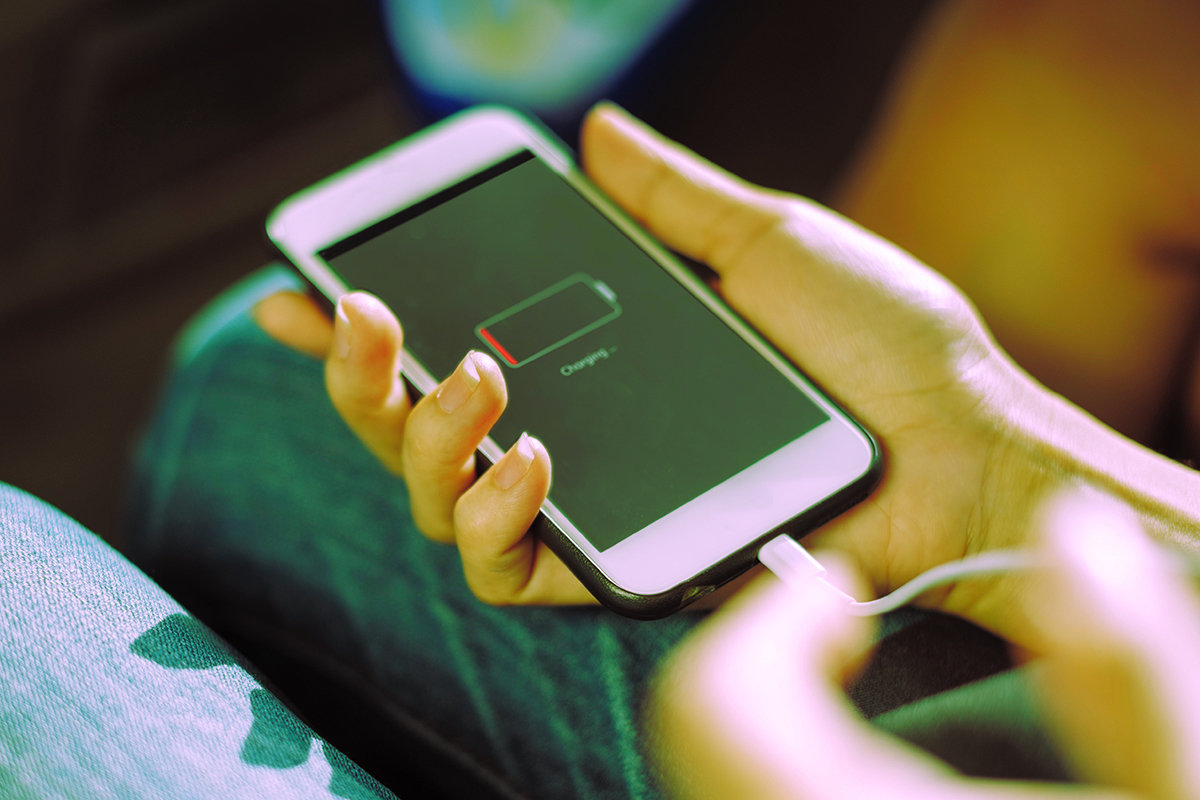The Digital Epidemic: Smartphone Addiction and Its Impact among Youths

Do you ever feel like you can’t put your phone down? Like you’re constantly checking it, even when you know you shouldn’t? If so, you’re not alone. Smartphone addiction is a real problem, and it’s only getting worse.
In fact, a recent study found that nearly half of all Smartphone users are addicted to their phones. That’s a staggering number, and it’s one that’s having a serious impact on our lives.
Smartphone addiction can lead to problems with our relationships, our work, and our health. It can also make it difficult to focus, learn, and sleep.
So if you’re worried that you might be addicted to your phone, there’s no time like the present to do something about it. There are a number of resources available to help you break the habit, and it’s worth it to make the effort. Your life will be better for it.
Smartphone addiction is serious
In a world increasingly interconnected by technology, where virtual realms merge seamlessly with our daily lives, a new epidemic has silently taken hold, trapping millions with its grip.
Welcome to the era of the Smartphone addiction, a modern affliction that transcends borders and creeps into the deepest recesses of our existence. With a flicker of a screen, we are transported into a tunnel of notifications, likes, and infinite scrolling, surrendering our precious time, attention, and perhaps even our sanity.

As the boundaries between the virtual and real blur, it is high time we unveil the captivating reality of this technological seduction and confront the urgent question: Are we in control, or are we merely puppets, dancing to the rhythm of our digital overlords?
Smartphone has become an integral part of our lives, transforming the way we communicate, work, and access information. However, excessive and compulsive Smartphone use has given rise to a concerning phenomenon known as Smartphone addiction. Here, we will delve into the meaning of Smartphone addiction, explore its symptoms, discuss its impacts on youths and society, review recent research findings, and propose measures to address this growing problem.
Smartphone addiction, also known as problematic Smartphone use or Smartphone dependency, refers to an excessive and compulsive use of Smartphone, leading to negative consequences in various aspects of an individual’s life. It is characterized by an uncontrollable urge to constantly check and use Smartphone, even when it interferes with daily activities, relationships, and overall well-being.
Symptoms of Smartphone addiction:
The following are the key symptoms of Smartphone addiction:
- Excessive screen time: Individuals with Smartphone addiction often spend an excessive amount of time on their devices, neglecting other activities and responsibilities. According to a 2020 report by Statista, the average daily time spent on Smartphone worldwide is around 3 hours and 10 minutes, with some individuals spending significantly more.
- Withdrawal and anxiety: When separated from their Smartphone, addicted individuals may experience withdrawal symptoms similar to those seen in substance addiction. Anxiety, restlessness, and irritability are common manifestations. A study published in the journal Computers in Human Behavior in 2022 found that Smartphone separation leads to increased heart rate, blood pressure, and self-reported anxiety.
- Compulsive checking: Constantly checking for notifications, messages, and updates becomes a compulsion for Smartphone addicts. They may feel a strong urge to constantly refresh social media feeds or email inboxes. A survey conducted by the Pew Research Center in 2021 revealed that 67 percent of Smartphone owners checked their devices for notifications even when it didn’t vibrate or ring.
- Neglecting real-life interactions: Smartphone addiction can lead to a decline in face-to-face social interactions. Addicted individuals may find it challenging to engage in conversations or spend quality time with friends and family. A study published in the journal Computers in Human Behavior in 2020 found that higher Smartphone addiction levels were associated with lower levels of face-to-face social interaction.
- Impaired productivity and concentration: Excessive Smartphone use can hinder productivity and concentration levels. Constant interruptions from notifications and the temptation to engage in Smartphone activities can disrupt focus and hinder task completion. A study published in the Journal of the Association for Consumer Research in 2019 found that participants who had their Smartphone nearby, even if not in use, performed worse on cognitive tasks compared to those without their phones nearby.
- Sleep disturbances: The blue light emitted by Smartphone can interfere with sleep patterns, leading to difficulties falling asleep or maintaining quality sleep. According to a study published in the journal PLOS ONE in 2017, increased Smartphone use before bedtime was associated with poor sleep quality and decreased sleep duration.
- Negative impact on mental health: Smartphone addiction has been linked to various mental health issues, including depression, anxiety, and low self-esteem. A systematic review published in the Journal of Behavioral Addictions in 2019 found a significant association between Smartphone addiction and symptoms of depression and anxiety.
- Physical health problems: Prolonged Smartphone use can contribute to physical health problems such as neck pain, eye strain, and musculoskeletal issues. The increased reliance on Smartphone for activities like gaming and social media can lead to a sedentary lifestyle, contributing to obesity and other related health conditions.
While these symptoms may vary in intensity among individuals, recognizing their presence is crucial in addressing Smartphone addiction and finding a healthy balance in our digital lives.
Impacts of Smartphone addiction among youths
The impacts of smartphone addiction among youths are significant and wide-ranging. Here are some of the key impacts:
- Impaired academic performance: Excessive Smartphone use among youths can negatively impact academic performance. Constant distractions, reduced study time, and decreased focus on schoolwork can lead to lower grades and diminished educational outcomes. A study published in the journal Computers in Human Behavior in 2019 found a negative correlation between Smartphone addiction and academic achievement among college students.
- Social isolation: Smartphone addiction can contribute to social isolation and a decline in face-to-face interactions among youths. Excessive reliance on virtual communication and social media can replace real-life social connections, leading to feelings of loneliness and detachment. A study published in the Journal of Adolescence in 2017 found that higher levels of Smartphone addiction were associated with lower social competence and poorer social skills among adolescents.
- Poor mental health: Smartphone addiction has been linked to various mental health issues among youths, including depression, anxiety, and stress. The constant pressure to maintain online profiles, cyberbullying, and the fear of missing out (FOMO) can significantly impact their psychological well-being. A systematic review published in the journal Cyberpsychology, Behavior, and Social Networking in 2018 revealed a positive association between Smartphone addiction and depressive symptoms among adolescents.
- Sleep disturbances: Excessive Smartphone use before bedtime can disrupt the sleep patterns of youths. The exposure to blue light emitted by Smartphone can interfere with the production of melatonin, a hormone that regulates sleep. This can lead to difficulties falling asleep, decreased sleep duration, and poor sleep quality. According to a study published in the journal Sleep Medicine in 2019, Smartphone addiction was associated with a higher prevalence of poor sleep quality among adolescents.
- Physical health issues: Smartphone addiction can contribute to physical health problems among youths. Excessive sedentary behaviors associated with Smartphone use, such as prolonged sitting and reduced physical activity, can lead to weight gain, obesity, and related health conditions. A study published in the journal PLOS ONE in 2016 found that higher levels of Smartphone addiction were associated with increased sedentary behaviors and decreased physical activity among adolescents.
- Impaired cognitive development: Excessive Smartphone use can hinder cognitive development among youths. The constant multitasking, divided attention, and decreased focus on educational activities can affect memory, attention span, and critical thinking skills. A study published in the journal Frontiers in Psychology in 2018 found that higher levels of Smartphone addiction were associated with poorer inhibitory control and working memory among adolescents.
- Decline in interpersonal communication skills: Excessive Smartphone use may hinder the development of effective communication skills, resulting in difficulties in forming and maintaining meaningful relationships.
- Productivity loss: Smartphone addiction can lead to decreased productivity in the workplace or educational settings, affecting overall economic growth and individual performance.
- Public health concerns: Excessive Smartphone use is associated with sedentary behavior, contributing to a sedentary lifestyle and increasing the risk of obesity, cardiovascular diseases, and other health issues.
These effects highlight the importance of promoting responsible Smartphone use and creating a healthy digital environment for youths to ensure their well-being and holistic development.

Measures to solve the problems of Smartphone addiction:
Smartphone addiction can be prevented if timely and appropriate measures are taken. Here are key measures:
- Awareness and education: Increasing awareness about the potential risks and consequences of Smartphone addiction is crucial. Educational programs, workshops, and campaigns can provide information and promote responsible Smartphone use. Research published in the Journal of Medical Internet Research in 2019 found that educational interventions significantly reduced Smartphone addiction levels among college students.
- Setting usage limits: Establishing clear boundaries and setting usage limits can help individuals regulate their Smartphone usage. This can involve implementing designated “no-phone” times or creating technology-free zones in certain areas like bedrooms or during meals. A study published in the Journal of Behavioral Addictions in 2018 found that self-imposed limits on Smartphone use were associated with reduced addiction symptoms.
- Digital detox: Encouraging periodic digital detoxes can provide individuals with a break from constant Smartphone use. This involves designated periods of time where individuals disconnect from their devices and engage in offline activities. Research published in the journal Computers in Human Behavior in 2018 found that engaging in digital detox activities was associated with improved well-being and reduced Smartphone addiction symptoms.
- Utilizing app and device features: Smartphone manufacturers and app developers can play a role in addressing addiction by incorporating features that promote healthy usage. This can include features like screen time tracking, app usage limits, and notification management tools. Studies have shown that individuals who actively use these features report lower levels of Smartphone addiction symptoms.
- Promoting healthy offline activities: Encouraging youths and adults to engage in offline activities that foster social interactions, physical exercise, and hobbies can help reduce Smartphone addiction. This includes promoting sports, arts, community engagement, and other activities that provide alternative sources of entertainment and fulfillment.
- Building supportive environments: Creating environments that support responsible Smartphone use is important. This involves fostering a culture that values face-to-face interactions, communication skills, and balanced technology use. Schools, families, and workplaces can establish policies and guidelines that encourage healthy technology habits.
- Seeking professional help: For individuals with severe Smartphone addiction, seeking professional help from therapists or addiction specialists can be beneficial. Cognitive-behavioral therapy (CBT) and other evidence-based interventions have shown promising results in treating Smartphone addiction and addressing underlying issues.
It is important to note that these measures should be tailored to individual needs and circumstances. Combining multiple strategies and maintaining consistent efforts can help individuals and communities combat Smartphone addiction effectively.
Smartphone addiction poses a significant challenge to youths and society at large. As Smartphone usage continues to increase, it is crucial to recognize the symptoms, understand the adverse effects, and take proactive measures to address this issue. By promoting digital literacy, fostering healthy Smartphone habits, and implementing appropriate interventions, we can mitigate the negative impact of Smartphone addiction and create a more balanced and connected society.
Below are some links to research-based sources on smartphone addiction:
- How addicted are newly admitted undergraduate medical students to smartphones?: a cross-sectional study from Chitwan medical college, Nepal : https://bmcpsychiatry.biomedcentral.com/articles/10.1186/s12888-020-02507-1
- link.springer.com/article/10.1007/s11620-021-00596-y
- Prevalence of Smartphone Addiction during COVID-19 Pandemic Lockdown and Its Impact on Online Learning in Kathmandu: https://www.nepjol.info/index.php/mrj/article/download/43575/32993/128439
- Smartphone addiction is increasing across the world: A meta-analysis of 24 countries: https://osf.io/fsn6v/download
- The Impact of Smartphone Addiction on Mental Health: https://www.ncbi.nlm.nih.gov/pmc/articles/PMC7250217/
- The Prevalence of Smartphone Addiction in Adolescence: A Systematic Review and Meta-Analysis: https://www.frontiersin.org/articles/10.3389/fpsyg.2020.02164/full
Gajurel, the writer of this article, is a student and an animation enthusiast.














